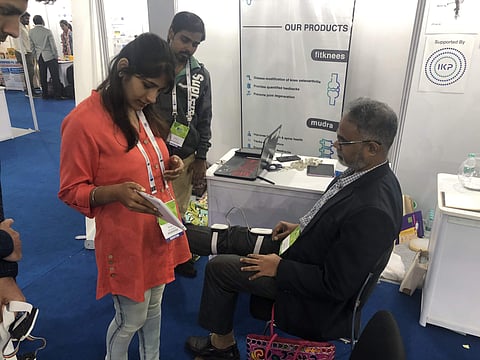

Though we are quick to run to the doctor when ailments plague us, we are quick to discontinue the treatment as soon as we see some improvement in our health. This is true especially when it comes to physiotherapy, exerts Anmol Ajay Saxena. And this is the conclusion she and Sandeep Reddy Goluguri arrived at after speaking to 150 physiotherapists across Bengaluru, Mumbai and Pune. "We inferred that over 80 per cent of patients with chronic ailments drop out after first consultation and 70 per cent drop out midway," shares the 24-year-old. The reasons are multifold — travelling to the clinic every other day is not conducive, it is time-consuming, expensive and a general lack of awareness about how each session really helps is prevalent. To solve this problem, they started Ashva Wearable Technologies.
In 2014, when Anmol was pursuing her second year in BTEch in Electrical and Electronic Engineering from Vellore Institute of Technology, she had started putting on weight and took to running to lose it. But running with obesity permanently damaged her knees — though she fell in love with running. "No amount of expensive sports shoes or anything else helped me," laments the youngster. She took up physiotherapy sessions at Christian Medical College, Vellore and continued to think about a solution to her painful knees so that she did not have to travel to the hospital every day for sessions. She thought about it so much that she and Sandeep developed Fitknees which won them the NSSN DataHack at CeBIT in December 2016 and again at AngelHack's annual Global Hackathon in 2018. This convinced them to quit their corporate job in August 2018 and plunge into field research.
But what is Fitknees? Before that, let's get back to where we started from. The survey of 150 physiotherapists which happened after they quit. "The doctors were not able to retain the patients and the patients were unable to understand the problem. So we had to come up with a solution that would be affordable, accessible and evidence-based," explains the Ghaziabad-born inventor. Thus, Fitkness, a device which comprises four wireless sensors, was born. When a patient exercises while wearing this device, which has over 10 internal tests that it conducts, the data is analysed real-time and shows up on the physician's tablet. What data? "Based on the person's height, weight, age and so on, we supply a normative data range. And the device helps us inform the patient and the doctor where they lie in the range," she explains. This data is on varying issues like how flexible your knees are, which is a boon for those suffering from osteoarthritis (when flexible tissue at the end of the bone wears down). It also tests quadriceps and hamstring muscle strength, balance and more. Even one degree of difference between sessions is recorded and the patient is able to see the difference in real-time. Which might motivate them to keep coming back for more and more sessions. That's the logic.
To measure all that is mentioned above one needs expensive and bulky gold standard equipment like a kinetic dynamometer, bobble boards and more. But this wearable device does away with the need for it. "Basically, our device tells you exactly how effective the treatment is. If the doctor is able to deliver the results, the patient sticks. Otherwise, the patient is empowered enough to choose another doctor," Anmol asserts. The phase two clinical trials of the device is on at St John's Hospital in Bengaluru and they aim to do their final trial next year. They are hoping to launch the device by February 2021. "In the beta trials with 75 physiotherapists, we achieved 80 per cent patient satisfaction," she shares.
Anmol believes that the future of the healthcare industry is remote and teleconsultation. "But I am not referring to what we are doing now. It has to be more personalised, patients need to feel more in touch. And that's where the wearable devices come in," concludes the entrepreneur.
